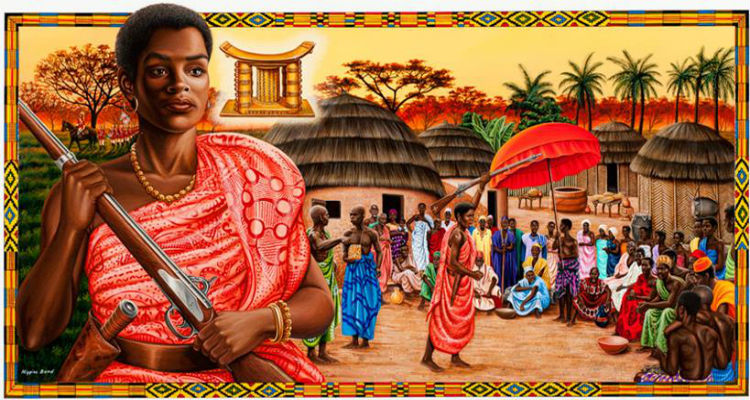“Yaa Asantewaa
The woman who fights before cannons
You have accomplished great things
You have done well”
Yaa Asantewaa (c. 1840 – 17 October 1921) was the Queen mother of Ejisu of the Ashanti Empire and Gatekeeper of the “Golden Stool” (Sika ‘dwa). In 1900, she led the War of the Golden Stool against the British, also known as the Yaa Asantewaa war. Her war against British colonialists is a story which is woven throughout the history of Ghana.
During her brother’s reign, Yaa Asantewaa saw the Ashanti Empire go through a series of events that threatened its future, including civil war from 1883 to 1888. When her brother died in 1894, Yaa Asantewaa, as Queen Mother nominated her own grandson as Ejisuhene. When the British exiled him in the Seychelles in 1896, along with the King of Ashanti Prempeh I and other members of the Ashanti government, Yaa Asantewaa became regent of the Ejisu-Juaben District.
In 1900, after the deportation of Prempeh I, the British colonial governor Frederick Hodgson, demanded the Golden Stool. Hodgson stated that King Prempeh I would continue to suffer an exile from his native land and that the Ashanti people were to surrender to the British their historical, ancestral Golden Stool. The Golden Stool was a dynastic symbol of the Ashanti empire, which was used to transfer power to each Asantahene during a ceremonial crowning.
The request by the British government led to a secret meeting of the remaining members of the Ashanti government at Kumasi, to discuss how to secure the return of their king. There was a disagreement among those present on how to go about this. Yaa Asantewaa, who was present at this meeting, saw that some of the leaders were afraid. Some said that there should be no war. They argued that instead they should beg the Governor to bring back the Asantehene King (Nana) Prempeh. It is reported that Yaa Asantewaa rose and addressed the members of the council with these now-famous words:
“Now I have seen that some of you fear to go forward to fight for our king. If it were in the brave days of, the days of Osei Tutu, Okomfo Anokye, and Opoku Ware, leaders would not sit down to see their king taken away without firing a shot.
No whyte man could have dared to speak to chief of the Ashanti in the way the Governor spoke to you leaders this morning. Is it true that the bravery of the Ashanti is no more? I cannot believe it. It cannot be! I must say this: if you the men of Ashanti will not go forward, then we will. We the women will. I shall call upon my fellow women.
We will fight the whyte men. We will fight till the last of us falls in the battlefields.”
Her speech stirred up the men who took an oath to fight the British until they released the Asantehene.
Beginning in March 1900, the Ashanti led by Yaa Asantewaa fought very bravely and kept the British in the fort at Kumasi where they had sought refuge. The fort still stands today as the Kumasi Fort and Military Museum. After several months, the Gold Coast governor eventually sent a force of 1,400 to quell the war. Queen Yaa Asantewaa and 15 of her closest advisers were captured, and they too were sent into exile to the Seychelles.
Yaa Asantewaa died in exile on 17 October 1921.
Three years after her death, on 27 December 1924, Prempeh I and the other remaining members of the exiled Ashanti court were allowed to return to home. Prempeh I made sure that the remains of Yaa Asantewaa and the other exiled Ashanti were returned for a proper royal burial.
Yaa Asantewaa’s dream for an her country’s independence was realized on 6 March 1957, when the Ashanti protectorate gained independence as part of Ghana, the first African nation to achieve this feat.
On August 3, 2000, a museum was dedicated to Queen Mother Nana Yaa Asantewaa at Kwaso in the Ejisu-Juaben District of Ghana.
Yaa Asantewaa remains a much-loved figure in Ashanti history and the history of Ghana as a whole for her role in confronting the colonialism of the British. She is immortalized in song as follows:
Koo koo hin koo
Yaa Asantewaa ee!
Obaa basia
Ogyina apremo ano ee!
Waye be egyae
Na Wabo mmode
(“Yaa Asantewaa
The woman who fights before cannons
You have accomplished great things
You have done well”)
Sources:
http://www.ghanaweb.com/GhanaHomePage/people/pop-up.php…
http://www.blackhistoryheroes.com/2010/05/queen-mother-nana-yaa-asantewaa.html
https://en.wikipedia.org/wiki/Yaa_Asantewaa



